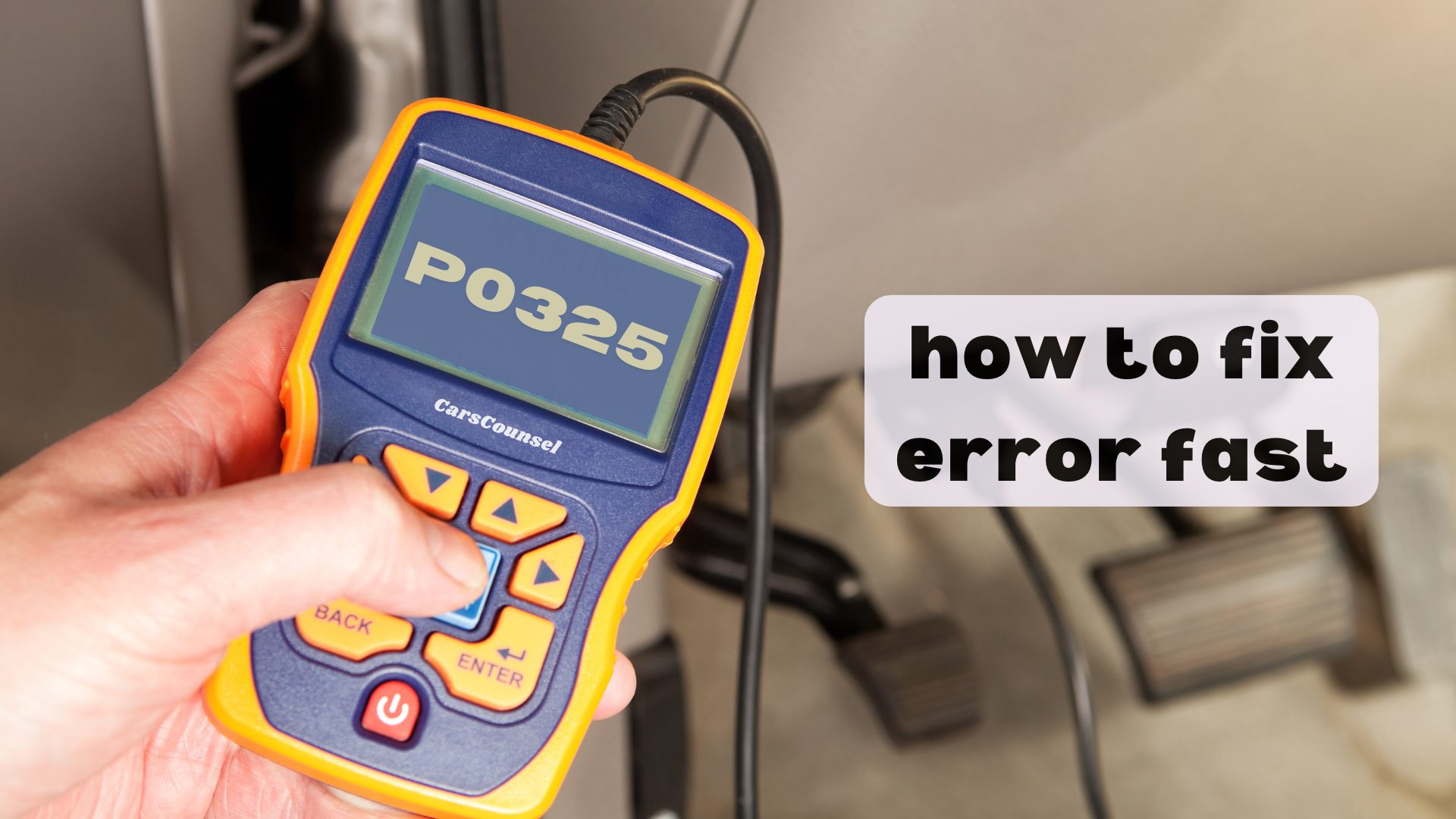It’s quite a coincidence that you’re searching for information on the P0325 code, as it’s one of the most common issues car owners face. You’ve probably noticed your Check Engine Light is on, and you’re wondering what’s going on under the hood.
The P0325 code indicates a problem with the Knock Sensor Circuit in Bank 1 of your engine, which is responsible for detecting abnormal vibrations or knocking. But what’s causing it, and how do you fix it? The answer lies in understanding the common causes, symptoms, and diagnosis steps – and that’s exactly where we’re about to take you next.

Quick Navigation
Key Takeaways
- P0325 code indicates a problem with the Knock Sensor Circuit in Bank 1, which detects abnormal engine vibrations and adjusts ignition timing.
- A faulty knock sensor, wiring issues, engine detonation, overheating, or ECM software problems can trigger the P0325 code.
- Symptoms include engine noise, loss of power, decreased fuel efficiency, illuminated Check Engine Light, and rough idling or stalling.
- Diagnosis and repair involve inspecting the wiring and connectors, replacing the knock sensor if necessary, and checking ECM software for updates.
- Ignoring the P0325 code can damage the engine, so prompt diagnosis and repair are essential to prevent costly repairs.
Code P0325 Description
When your vehicle’s onboard diagnostic system generates a P0325 code, it indicates a problem with the Knock Sensor Circuit in Bank 1 of the engine.
This sensor detects abnormal vibrations or knocking in the engine, sending a signal to the engine control module (ECM) to adjust ignition timing and prevent potential engine damage.
Engine detonation or improper fuel combustion can cause knocking, which, if left unchecked, may lead to engine failure.
The knock sensor circuit detects and prevents engine damage. If faulty, sensor replacement may be necessary to resolve the issue and prevent further damage.
Common Causes of P0325
Several factors can trigger the P0325 code, and understanding these causes is crucial to addressing the issue effectively.
You’ll need to identify the root cause to prevent further engine damage and restore peak engine performance. A faulty knock sensor is a common culprit, leading to sensor failure and affecting engine performance.
Wiring or connector issues in the knock sensor circuit can also trigger the error code. Additionally, engine detonation or pre-ignition, engine overheating, and ECM software issues can cause the P0325 code.
Symptoms of the P0325 Code
Identifying the symptoms of the P0325 code is essential in determining the extent of the problem and taking corrective action.
You’ll want to pay attention to any unusual sounds or performance issues with your vehicle.
- You may hear Engine Noise, such as knocking or pinging sounds, which can indicate engine detonation or improper fuel combustion.
- You might experience Loss of Power or Acceleration, making it difficult to drive uphill or merge onto a highway.
- Decreased Fuel Efficiency can also occur, resulting in higher fuel costs and increased emissions.
- The Check Engine Light will likely be illuminated, indicating a problem with your engine.
- You may notice Rough Idling or Engine Stalling, especially when stopping or starting your vehicle.
Diagnosis and Repair Steps
One crucial step in resolving the P0325 code is to diagnose the specific cause of the problem using a scan tool.
This will help you identify the root cause of the issue, whether it’s a faulty knock sensor, wiring or connector issues, engine detonation, or ECM software problems.
Once you’ve pinpointed the cause, you can start repairing the issue. Inspect the wiring and connectors in the knock sensor circuit for damage or corrosion, and replace the knock sensor in Bank 1 if necessary.
Fixing the Knock Sensor Circuit
When fixing the knock sensor circuit, you’ll need to inspect the wiring and connectors for signs of damage or corrosion.
This is a vital step to guarantee the circuit is functioning properly.
Make sure to:
- Check the wiring harness for any signs of wear or damage
- Inspect the connectors for corrosion or loose connections
- Clean the knock sensor and its surrounding area to guarantee proper signal transmission
- Verify the knock sensor is securely mounted and not loose
- Consult your repair manual for specific instructions on accessing and repairing the knock sensor circuit in your vehicle
Repair Costs and Estimates
As you prepare to tackle the P0325 code repair, it’s essential to understand the estimated costs involved.
Shop estimates for this repair typically range from $150 to $400, including parts and labor. However, actual costs may vary depending on the specific cause of the problem, your vehicle’s make and model, and labor rates in your area.
Vehicle variations, such as engine type and year, can also impact the final cost. It’s vital to consult a professional mechanic for an accurate estimate, as they can assess the situation and provide a more detailed breakdown of the costs.
Importance and Difficulty Levels
In conjunction with determining the repair costs, it’s crucial to understand the importance and difficulty levels of fixing the P0325 code.
You need to assess how critical it’s to repair the issue and how challenging the process will be.
- The repair importance level is 2, indicating that the problem should be addressed soon to prevent engine damage.
- The repair difficulty level is also 2, meaning it’s moderately complex and may require some technical expertise.
- DIY feasibility is moderate, but it’s recommended to consult a professional mechanic if you’re not familiar with knock sensor circuits.
The repair complexity is relatively low, but it still requires attention to detail and proper diagnosis.
Properly fixing the P0325 code can prevent costly engine repairs down the road.
Preventing Future Occurrences
To prevent the P0325 code from reoccurring, you should prioritize routine maintenance and address potential issues before they escalate.
Regular maintenance, such as oil changes and tune-ups, can help identify and fix problems before they cause the knock sensor circuit to malfunction.
Additionally, using high-quality fuel can reduce the risk of engine detonation and pre-ignition, which can trigger the P0325 code.
Make sure to check your owner’s manual for the recommended fuel type and octane rating for your vehicle.
More OBD-II Codes
Frequently Asked Questions
Can I Drive My Car With a P0325 Code?
You can drive your car with caution, but it’s not recommended for extended periods. The P0325 code indicates a knock sensor issue, which may lead to engine damage if neglected, compromising safe operation and potentially causing further driving restrictions.
Will a P0325 Code Cause Permanent Engine Damage?
If you ignore sensor failure, it can catastrophically compromise your engine’s performance, leading to permanent damage. Delaying repairs can cause detonation, overheating, and premature wear, so it’s vital to address the issue promptly to prevent long-term engine harm.
Can a Faulty Oxygen Sensor Trigger a P0325 Code?
You won’t typically see a faulty oxygen sensor trigger a P0325 code, as the O2 sensor is located downstream of the engine, whereas the knock sensor is near the engine block, detecting vibrations; faulty sensor symptoms would manifest differently.
Do All Vehicles Have a Knock Sensor Circuit?
You may be surprised to learn that not all vehicles have a knock sensor circuit, but most modern engines do, as it’s a vital component that detects abnormal vibrations, allowing the engine control module to adjust ignition timing and prevent damage.
Can I Replace the Knock Sensor Myself?
You can replace the knock sensor yourself, but be prepared for DIY challenges like sensor troubleshooting and accessing the sensor location, which may require specialized tools and technical expertise to avoid damaging the engine or sensor circuit.
Conclusion
You’ve finally diagnosed and fixed the P0325 code, and your engine’s running smoothly again. But did you know that according to a study, 70% of engine damage is caused by ignoring the Check Engine Light? Don’t let that be you – staying on top of issues like faulty knock sensors can save you thousands in repair costs down the line. By addressing the P0325 code promptly, you’ve taken a vital step in protecting your engine’s health and extending its lifespan.

